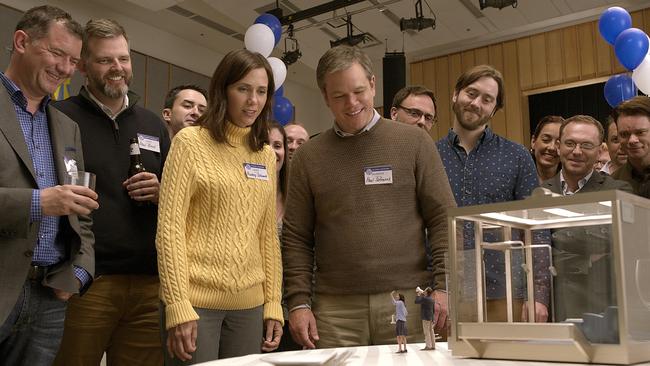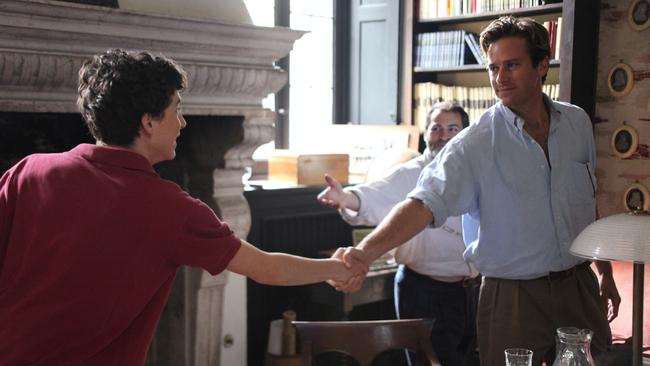Reviews: Downsizing, Call Me By Your Name
Imagine the benefits of being shrunk. Cheaper housing, food and bills ... but of course there are complications.

Alexander Payne’s highly original new sci-fi comedy, Downsizing, starts with a novel suggestion on how to cope with climate change and an increasingly overpopulated planet. A Norwegian scientist, Dr Jorgen Asbjornsen (Rolf Lassgard), has devised a formula to reduce the size of a human being by a ratio of 2744 to one and, as he announces at a conference on human sustainability in Istanbul, he has experimented on himself: he and his wife are now no bigger than a finger.
The advantages are clear: “minimised” people leave a smaller footprint on the planet, take up less space, consume less food. And for these little people everything will be cheaper because the houses in which they live will also be smaller. The process is irreversible, though; once downsized, there’s no going back.
A few years after the scientist’s earth-shattering announcement, and without government involvement, private enterprise has taken up the challenge in a big way, creating little communities such as Leisureland to house the miniature citizens. Downsizing has become a streamlined, assembly-line process, though there is the occasional accident — one poor fellow’s head exploded, we’re informed, because of his gold teeth.
Paul Safranek (Matt Damon) is an occupational therapist, a podgy Everyman who lives in Omaha, Nebraska, with his wife, Audrey (Kristen Wiig). When they attend a school reunion and meet a couple of old friends who have happily downsized, they decide to give it a go. The main attraction for them has nothing to do with saving the planet — it just means they’ll be able to afford a far more lavish lifestyle.
Things, of course, don’t turn out quite like that, and it wouldn’t be fair to give away too much of the plot. Suffice it to say that Paul isn’t as over the moon about his new lifestyle as he thought he would be.
Payne is a superb filmmaker, as anyone who’s seen his earlier work, including About Schmidt, Sideways and Nebraska,will testify. Downsizing is his most ambitious satire on the human condition and for much of its length it’s brilliantly done as it takes us on what seems to be an all-too-plausible journey. The central section of the film introduces new characters: Christoph Waltz and Udo Kier, both hilarious as Eurotrash types, and Hong Chau, who plays one-legged Vietnamese immigrant Ngoc Lan, who works as a house cleaner in Leisureland.
It’s through this character that Paul, a typically blinkered middle-American, is made aware of the existence of less advantaged people who, even in this brave new world, are struggling to survive. He also discovers a massive Trumpian wall designed to keep “undesirables” out. Payne’s realisation of these scenes is masterly and confirms him as a provocateur without parallel in today’s mostly bland Hollywood.
It’s unfortunate, then, that the final part of the film, in which the action returns to Norway where it all began, is pretty unsatisfactory. It’s at this point that you really want to be emotionally involved in the characters and their situation, but somehow that doesn’t quite happen. It also extends the film’s running time needlessly to the 2¼-hour mark.
Despite this, Downsizing is a must-see this summer. Perhaps its flaws seem greater because the entire enterprise is so bold, imaginative, funny, troubling and daring. You want it to be a masterpiece but it falls a little short.

Call Me By Your Name is an Italian film made in English and it’s the latest to come from Luca Guadagnino, the director of the sublime I Am Love. Based on a 2007 novel by Andre Aciman, the film takes place in the summer of 1983 in a small town in Lombardy in the north of Italy.
The trees are laden with fruit, the midday heat is palpable and the streets of the old town are almost deserted in the middle of the day. In a cool, gracious villa on the edge of town, archeologist Professor Perlman (Michael Stuhlbarg) is deeply engaged in his research work while his French wife, Annella (Amira Casar), and their 17-year-old son, Elio (Timothee Chalamet), while away the lazy days.
Every summer the professor invites a promising doctoral student to assist him in his research and this summer that role has fallen to an American, Oliver (Armie Hammer), a handsome, charming, easygoing young man who clearly comes from a privileged background.
Oliver is given a bedroom next to the room in which Elio sleeps and they share a bathroom.
Elio takes it upon himself to show the visitor around, cycling with him to the town, where the American demonstrates an ability to quickly and easily makes friends.
Elio has a girlfriend, Marzia (Esther Garrel); they’ve known one another since they were small children and they’re close friends who, everyone assumes, will become lovers one day — but not yet. As for Oliver, it seems as though he’s attracted to Marzia’s friend Chiara (Victoire du Bois).
Gradually, though, Elio draws closer to Oliver, though the American at first pushes him away — realising, no doubt, that the youth is vulnerable and impressionable. But as one hot summer day follows another, the friendship between the American and the Italian youth grows visibly more intimate.
Guadagnino’s film, beautifully photographed by Sayombhu Mukdeeprom, was adapted for the screen by James Ivory, who, as the director of the well-regarded Merchant-Ivory films (Howard’s End, A Room with a View, The Remains of the Day) was always attracted to this kind of story in which love and passion simmer just beneath an elegantly depicted surface.
It was certainly a happy combination of talents; Ivory’s cool, literal style blends very well with the director’s lush, empathetic approach.
You may need a little patience, because Guadagnino is in no hurry to tell the story. He’s more interested in assembling a wealth of small details and incidents that very gradually evolve into something deep and profound.
Hammeris exceptionally fine in the film, convincingly portraying the blue-blooded American eager to seek out everything Europe has to offer, while Chalamet is perfect as the indecisive youth who is drawn to this exotic stranger in ways he himself can’t fully comprehend.
Best of all, perhaps, is Stuhlbarg, an actor who is often cast in marginal roles (look for him in the upcoming The Shape of Water) but who is given, for once, a really complex character to play: a late scene in which he has a frank conversation with his son proves to be the highlight of the movie — though, given that the film is taking place in 1983, it’s a little surprising AIDS is never mentioned.
The film is filled with weighty references; the Perlman family is Jewish, and Jewish identity is just one of the elements thrown into the mix, along with literature, poetry and music (Elio, who speaks several languages, plays the guitar and the piano with relaxed expertise).
Yet the most memorable scenes play outdoors, as the friends ride their bicycles or swim, or just relax in the hot Italian summer sun.
Downsizing (M)
3.5 stars
National release from Boxing Day
Call Me By Your Name (M)
4 stars
Limited national release from Boxing Day
